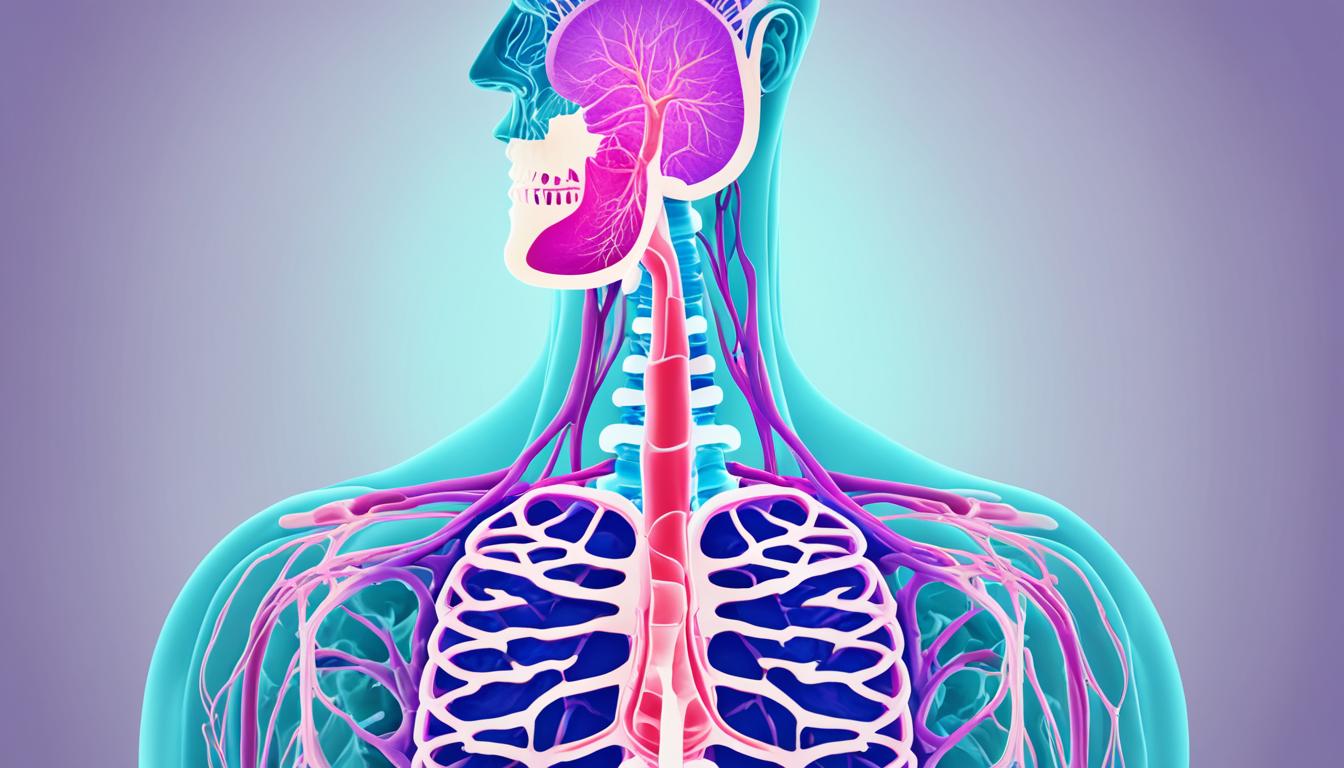Did you know that approximately 20 million Americans have some form of thyroid disease?
Your thyroid gland plays a crucial role in regulating your metabolism, energy levels, and overall well-being. When your thyroid is out of balance, it can have a significant impact on your health and quality of life. That’s why it’s essential to take care of your thyroid and ensure it functions optimally.
In this Thyro Care Guide, we will explore various strategies, tips, and lifestyle changes that can support a balanced thyroid and promote overall thyroid health. From understanding the functions and disorders of the thyroid to navigating supplements and holistic approaches, we will provide you with the knowledge and tools necessary to care for your thyroid effectively.
Key Takeaways:
- Approximately 20 million Americans have some form of thyroid disease.
- Your thyroid gland plays a vital role in regulating your metabolism and overall well-being.
- This Thyro Care Guide will provide tips and strategies to support a balanced thyroid.
Understanding Your Thyroid: Functions and Disorders
The thyroid gland plays a crucial role in maintaining overall health by regulating metabolism and influencing various body processes. Understanding the functions of the thyroid and the disorders that can affect it is essential for promoting optimal thyroid health.
The Role of the Thyroid in Metabolic Regulation
The thyroid gland controls metabolism, the process by which the body converts food into energy. It produces hormones, primarily thyroxine (T4) and triiodothyronine (T3), that regulate the rate at which cells use energy. These hormones influence vital functions such as heart rate, body temperature, and digestion.
The thyroid gland is controlled by the pituitary gland in the brain, which produces thyroid-stimulating hormone (TSH). TSH signals the thyroid to release T4, which is then converted into T3 in various organs and tissues.
Hyperthyroidism vs. Hypothyroidism: Symptoms and Overlaps
Thyroid disorders can disrupt the normal functioning of the thyroid gland, leading to an imbalance of thyroid hormones. Hyperthyroidism occurs when the thyroid produces an excessive amount of hormones, while hypothyroidism occurs when the thyroid does not produce enough hormones.
Hyperthyroidism is often characterized by symptoms such as weight loss, rapid heartbeat, anxiety, irritability, and sensitivity to heat. On the other hand, hypothyroidism may cause symptoms like weight gain, fatigue, depression, constipation, and feeling cold.
Despite the differences in symptoms, hyperthyroidism and hypothyroidism can also share some common signs. These can include changes in appetite, difficulty sleeping, muscle weakness, hair loss, and mood disturbances.
Thyroid Disease Prevalence and Its Impact on Health
Thyroid disease is prevalent in the United States, with millions of people affected. According to the American Thyroid Association, an estimated 20 million Americans have some form of thyroid disease, and up to 60% of those affected may be unaware of their condition.
Thyroid disorders can have a significant impact on overall health if left untreated. They can affect various bodily systems, leading to complications such as cardiovascular problems, fertility issues, and cognitive impairment. It is crucial to diagnose and manage thyroid disorders effectively to minimize their impact on health and well-being.
| Thyroid Disorder | Prevalence |
|---|---|
| Hyperthyroidism | Approximately 1.2% of the US population |
| Hypothyroidism | Approximately 4.6% of the US population |
| Thyroid nodules | Afflict about 50% of the US population over 60 years old |
| Thyroid cancer | More than 50,000 new cases are diagnosed each year |
Lifestyle Changes for a Healthy Thyroid
Importance of Diet: Sugar, Processed Foods, and Cruciferous Vegetables
To promote a healthy thyroid, it is essential to make lifestyle changes that support optimal thyroid function. One crucial aspect is maintaining a thyroid-healthy diet. Certain foods can either benefit or negatively affect thyroid health. For example:
- Sugar: Consuming excessive amounts of sugar has been linked to thyroid dysfunction. It is recommended to reduce the intake of added sugars and opt for natural sweeteners like honey or stevia instead.
- Processed Foods: Processed foods often contain artificial additives, preservatives, and unhealthy fats that can disrupt thyroid function. It is advisable to prioritize whole, unprocessed foods for better thyroid health.
- Cruciferous Vegetables: While cruciferous vegetables like broccoli, cauliflower, and cabbage are nutrient-dense and offer numerous health benefits, they contain compounds called goitrogens. These compounds can interfere with thyroid function when consumed in large amounts. However, cooking cruciferous vegetables can help neutralize goitrogens, making them safe for consumption. It is important to note that unless a person has an underlying thyroid condition, moderate consumption of these vegetables is generally safe and beneficial.
Exercise and Thyroid Function: Boosting Metabolism
Regular exercise plays a crucial role in supporting thyroid function and maintaining a healthy metabolism. Physical activity stimulates the production and conversion of thyroid hormones, leading to a more efficient metabolic rate. Engaging in both cardiovascular exercises, such as jogging or cycling, and strength training exercises, such as weightlifting or yoga, can help promote thyroid health and overall well-being.
Stress Reduction Strategies and Hormonal Balance
Chronic stress can disrupt hormonal balance, including thyroid function. Therefore, it is important to adopt stress reduction strategies to support thyroid health. Some effective strategies include:
- Practicing mindfulness and meditation
- Engaging in regular physical activity
- Prioritizing self-care activities
- Ensuring quality sleep
- Seeking support from friends, family, or professionals
By implementing these lifestyle changes, individuals can take proactive steps towards maintaining a healthy thyroid and promoting overall well-being.

Dietary Factors Influencing Thyroid Health
To support optimal thyroid function, it is important to consider the dietary factors that can influence thyroid health. Certain nutrients play a crucial role in the production and regulation of thyroid hormones, and incorporating them into your diet can help maintain a healthy thyroid gland.
Iodine-Rich Foods and Their Role in Thyroid Function
Iodine is an essential mineral that is vital for proper thyroid function. It is a key component of thyroid hormones, which play a crucial role in regulating metabolism and supporting overall health. Consuming iodine-rich foods can help ensure an adequate supply of this important mineral.
Some examples of iodine-rich foods include:
- Sea vegetables such as seaweed, kelp, and nori
- Dairy products like milk, yogurt, and cheese
It is important to note that iodine requirements can vary depending on factors such as age, sex, and pregnancy status. Consulting with a healthcare professional can help determine the appropriate iodine intake for your specific needs.
Selenium and Zinc: Trace Elements Vital to Thyroid Health
In addition to iodine, other trace elements like selenium and zinc also play a crucial role in maintaining thyroid health.
Selenium is necessary for the production of thyroid hormones and helps protect the thyroid gland from damage caused by oxidative stress. Good food sources of selenium include Brazil nuts and whole grains.
Zinc is involved in thyroid hormone synthesis and helps regulate the conversion of inactive thyroid hormone into its active form. Foods rich in zinc include oysters, beef, poultry, beans, and nuts.
Ensuring an adequate intake of selenium and zinc through a balanced diet can help support thyroid health.

The Role of Nutrition in Thyroid Health
“Proper nutrition is essential for optimal thyroid function. By incorporating iodine-rich foods, selenium, and zinc into your diet, you can support the health of your thyroid gland and promote overall wellbeing.”
In conclusion, dietary factors play a significant role in influencing thyroid health. Consuming iodine-rich foods, as well as ensuring adequate intake of selenium and zinc, can help support optimal thyroid function. A well-balanced diet that includes these essential nutrients can contribute to the overall health and wellbeing of your thyroid gland.
Medical Intervention and Thyro Care
If you suspect thyroid issues or have received abnormal results from routine thyroid screening, seeking medical intervention is crucial for proper diagnosis and treatment. Thyrocare, a renowned provider of diagnostic tests, plays a significant role in supporting thyroid care. In this section, we delve into why Thyrocare tests are affordable and how reliable they are. Additionally, we guide you on when to seek a professional thyroid check and offer insights into the workings of Thyrocare lab and their testing procedures.
Why Thyrocare Tests Are So Cheap and How Reliable Is Thyrocare?
Thyrocare has gained popularity for offering cost-effective tests without compromising reliability. The reason behind the affordability lies in their unique operational model, which focuses on high-volume testing and efficient processes. By streamlining their operations, Thyrocare minimizes overhead costs and passes on the savings to patients. Rest assured, despite the cost-friendly nature of these tests, Thyrocare maintains stringent quality control measures to ensure accurate and reliable results, meeting international standards.
When to Seek a Professional Thyroid Check
If you experience persistent symptoms such as unexplained weight changes, fatigue, mood swings, hair loss, or changes in skin texture, it may be an indication of thyroid dysfunction. In such cases, it is advisable to seek a professional thyroid check. Additionally, individuals with a family history of thyroid disorders or those with risk factors such as autoimmune diseases should also consider regular thyroid screening. Timely detection and management of thyroid conditions can help prevent complications and ensure optimal thyroid health.
Understanding Thyrocare Lab and Their Testing Procedures
Thyrocare lab is equipped with state-of-the-art technology and staffed by highly skilled professionals, ensuring accurate and efficient testing. Their testing procedures are designed to provide comprehensive insights into thyroid health. From simple blood tests to advanced hormone profiling, Thyrocare covers a wide range of diagnostic tests to evaluate thyroid function. These procedures are conducted with utmost care and precision, adhering to strict quality control measures to deliver reliable and informative results to healthcare providers and patients.

With the guidance of medical professionals and the reliable services provided by Thyrocare, you can take proactive steps towards better thyroid health. The next section will explore the environmental and chemical factors that affect the thyroid, further expanding our understanding of comprehensive Thyro Care.
Environmental and Chemical Factors Affecting the Thyroid
In addition to lifestyle factors, environmental and chemical influences play a significant role in thyroid health. Understanding these factors is crucial for maintaining optimal thyroid function and overall well-being.
Endocrine Disruptors: Recognizing and Mitigating Risks
Endocrine disruptors are foreign substances that interfere with the body’s endocrine system, including the thyroid. These disruptors can be found in various everyday products, such as plastics, pesticides, and personal care items. Recognizing and mitigating the risks associated with these substances is essential for preserving thyroid health.
Endocrine disruptors can mimic or block the hormones in our body, leading to hormone imbalances and potential thyroid dysfunction.
Some steps you can take to reduce exposure to endocrine disruptors include:
- Avoiding plastic containers and opting for glass or stainless steel alternatives.
- Choosing organic fruits and vegetables to minimize pesticide consumption.
- Using natural and non-toxic personal care products.
- Filtering your tap water to eliminate potential contaminants.
By being proactive in identifying and avoiding endocrine disruptors, you can support a healthy thyroid and overall well-being.
Chronic Inflammation, Stress, and Oxidative Stress Impacts
Chronic inflammation, stress, and oxidative stress can have adverse effects on thyroid health. These factors can disrupt the production and regulation of thyroid hormones, leading to imbalances and dysfunction.
Chronic inflammation, often resulting from poor diet or underlying health conditions, can contribute to autoimmune thyroid diseases such as Hashimoto’s thyroiditis and Graves’ disease. Managing chronic inflammation through a balanced diet, regular exercise, and stress-reduction techniques is essential for maintaining thyroid health.
Stress, whether it is acute or chronic, can also impact thyroid function. Stress hormones released during stressful situations can interfere with the conversion of inactive thyroid hormone (T4) to its active form (T3), leading to an imbalance in thyroid hormone levels. Implementing stress-management techniques such as meditation, deep breathing exercises, and engaging in relaxing activities can help support thyroid health.
Oxidative stress, which occurs when an imbalance between free radicals and antioxidants in the body occurs, can damage cells, including the thyroid gland. Incorporating antioxidant-rich foods, such as berries, leafy greens, and nuts, into your diet can help combat oxidative stress and protect thyroid health.

Understanding and addressing the environmental and chemical factors that affect the thyroid is vital for maintaining optimal thyroid health. By recognizing and mitigating the risks posed by endocrine disruptors and implementing strategies to manage chronic inflammation, stress, and oxidative stress, you can support a healthy thyroid and overall well-being.
Thyro Care: Navigating Supplements and Nutrients
When it comes to supporting thyroid health, supplements and nutrients play a crucial role. Navigating through the various options can be overwhelming, but understanding the role of micronutrients and the benefits of specific supplements can help you make informed choices.
The Role of Micronutrients: Iodine, Iron, Selenium, and Zinc
Micronutrients, such as iodine, iron, selenium, and zinc, are essential for proper thyroid function. Iodine is a key component of thyroid hormones, and its deficiency can lead to hypothyroidism. Including iodine-rich foods like seaweed, dairy products, and iodized salt in your diet can help maintain optimal iodine levels.
Iron is necessary for thyroid hormone synthesis and transport. An iron deficiency can impair thyroid function and lead to thyroid disorders. Incorporating iron-rich foods like lean meats, legumes, and dark leafy greens into your diet can help support thyroid health.
Selenium plays a crucial role in thyroid hormone metabolism and protection against oxidative stress. Including selenium-rich foods like brazil nuts, seafood, and organ meats in your diet can help support thyroid function.
Zinc is involved in thyroid hormone production and regulation. Zinc deficiency can adversely affect thyroid function. Consuming zinc-rich foods like oysters, beef, and pumpkin seeds can help maintain optimal zinc levels and support thyroid health.
Addressing Thyroid Health Through Supplements Like Ashwagandha
In addition to micronutrients, certain supplements can play a beneficial role in addressing thyroid health. One such supplement is ashwagandha, an adaptogenic herb known for its potential to support healthy thyroid function. Ashwagandha has been traditionally used in Ayurvedic medicine for its anti-inflammatory and antioxidant properties. It may help balance thyroid hormone levels and support overall thyroid health.
However, it is important to note that while supplements like ashwagandha may have potential benefits, it is always advisable to consult with a healthcare professional before starting any new supplement regimen. They can assess your individual needs and determine the appropriate dosage and duration for your specific condition.
By understanding the role of micronutrients and exploring the potential benefits of supplements like ashwagandha, you can navigate the world of thyroid supplements and nutrients with confidence, making choices that support your overall thyroid health.
Thyro Care and Holistic Approaches
In addition to medical interventions and dietary changes, holistic approaches play a crucial role in thyroid care. By taking a comprehensive approach to thyroid health, you can optimize your well-being and support the natural balance of thyroid hormones.
Gut-Thyroid Axis: The Importance of Digestive Health
The gut-thyroid axis is the bidirectional relationship between the gut microbiota and the thyroid gland. Research has shown that imbalances in gut health can contribute to thyroid dysfunction and vice versa. Therefore, maintaining a healthy digestive system is essential for promoting optimal thyroid function and overall well-being.
One strategy for supporting the gut-thyroid axis is to prioritize digestive health through lifestyle modifications. This includes consuming a nutrient-dense diet that is rich in fiber, probiotics, and prebiotics. These components help nourish the gut microbiota and promote a healthy digestive system, which in turn supports thyroid health.
Another approach is to identify and address any underlying gut issues that may be affecting thyroid function. Conditions such as leaky gut syndrome and gut inflammation can disrupt the gut-thyroid axis and contribute to hormonal imbalances. Working with a healthcare professional to evaluate and address these issues can help restore balance and optimize thyroid health.
Strategies for Balancing Thyroid Hormones Naturally
Alongside prioritizing digestive health, there are various strategies you can implement to naturally balance thyroid hormones:
- Eat a balanced diet: Include foods rich in essential nutrients for thyroid function, such as iodine, selenium, and zinc. Incorporate foods like seaweed, Brazil nuts, and legumes into your meals.
- Reduce stress: Chronic stress can negatively impact thyroid function. Practice stress management techniques like meditation, deep breathing, and regular exercise to support hormonal balance.
- Get quality sleep: Aim for sufficient sleep each night as inadequate sleep can disrupt thyroid hormone production.
- Maintain a healthy weight: Excess weight can contribute to hormonal imbalances. Engage in regular physical activity and focus on a balanced, nutritious diet to support weight management.
- Consider herbal supplements: Certain herbs, such as ashwagandha and guggul, have been traditionally used to support thyroid health. Consult with a healthcare professional before incorporating any new supplements into your routine.
By adopting these holistic approaches, you can optimize thyro care and promote balanced thyroid health naturally.
Conclusion
Now that you have reached the end of the Thyro Care Guide, let’s recap the key points and tips for achieving balanced thyroid health. Taking care of your thyroid is crucial for overall well-being and maintaining optimal health.
Throughout this guide, we have discussed the functions of the thyroid gland and the various disorders that can affect it. We have explored the importance of lifestyle changes, such as following a thyroid-healthy diet, engaging in regular exercise, and reducing stress to support thyroid function.
In addition, we have highlighted the significance of dietary factors, including consuming iodine-rich foods and trace elements like selenium and zinc. We have also covered the role of medical intervention, Thyrocare tests, and the impact of environmental and chemical factors on thyroid health.
Remember, your thyroid plays a crucial role in your body’s metabolism, energy levels, and overall well-being. By incorporating the tips and strategies presented in this guide into your daily life, you can proactively support your thyroid health and promote a balanced and vibrant lifestyle.




